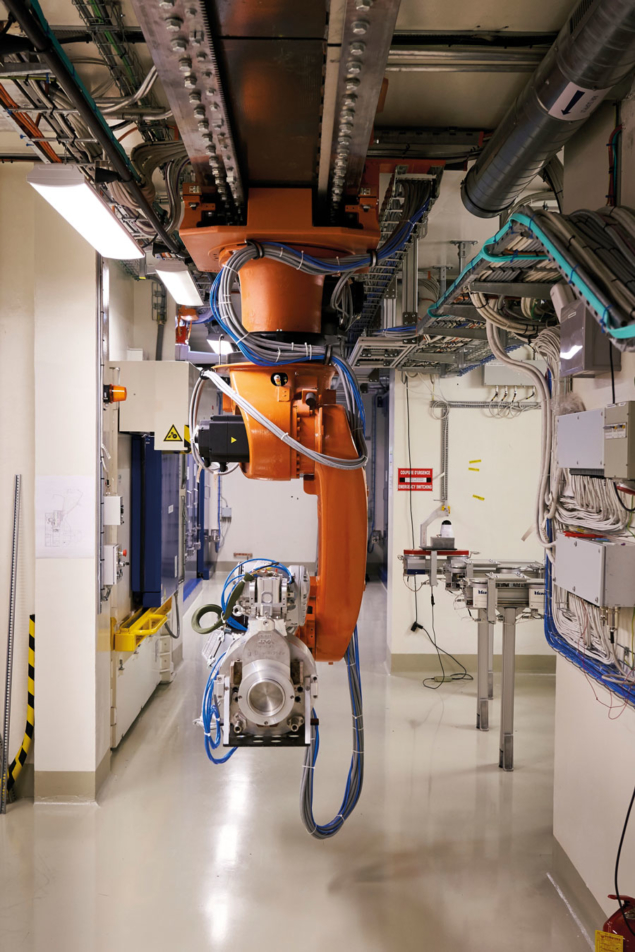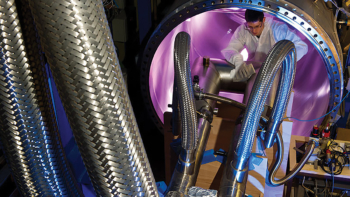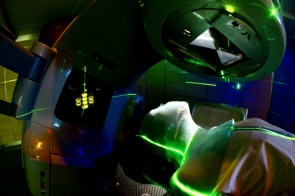CERN’s MEDICIS facility is producing novel radioisotopes for medical research.

The use of radioisotopes to treat cancer goes back to the late 19th century. Great strides have been made, and today radioisotopes are widely used by the medical community. Produced mostly in reactors and cyclotrons, radioisotopes are used both to diagnose cancers and other diseases, such as heart irregularities, as well as to deliver very small radiation doses exactly where they are needed to avoid destroying the surrounding healthy tissue.
However, many currently available isotopes do not combine the most appropriate physical and chemical properties and, in the case of certain tumours, a different type of radiation could be better suited. This is particularly true of the aggressive brain cancer glioblastoma multiforme and of pancreatic adenocarcinoma. Although external beam gamma radiation and chemotherapy can improve patient survival rates, there is a clear need for novel treatment modalities for these and other cancers.
On 12 December 2017, a new facility at CERN called MEDICIS produced its first radioisotopes for a batch of terbium (155Tb), which is part of a quadruplet of Tb isotopes considered promising for both diagnosis and treatment. MEDICIS is designed to produce unconventional radioisotopes with the right properties to enhance the precision of patient imaging and treatment, and already it has expanded the range of radioisotopes available for research projects.
Initiated in 2010, MEDICIS is driven by CERN’s Isotope Mass Separator Online (ISOLDE) facility. ISOLDE has been running for more than 50 years, producing 1300 different isotopes from 73 chemicals for research in many areas including fundamental nuclear research, astrophysics and life sciences. The year 2020 marks the 40th anniversary of the first biomedical imaging studies at ISOLDE with 167Tm, and a record operation performance for MEDICIS of 50% mass purification yield – a number which is very rarely met.
Although ISOLDE already produces isotopes for medical research, MEDICIS is now able to regularly produce isotopes with specific types of emission or new purity grades, such as the pure beta-emitter 169Er or 153Sm produced in nuclear reactors. These were restricted to niche treatments before MEDICIS could physically purify them during its 2019 and 2020 harvesting campaigns to grades that make them suitable for a new form of personalised medicine: targeted radioimmunotherapy.
ISOLDE directs a high-intensity proton beam from the Proton Synchrotron Booster onto specially developed thick targets, yielding a large variety of atomic fragments. During proton-beam operation, MEDICIS works by placing a second target behind ISOLDE’s: once the isotopes have been produced on the MEDICIS target, an automated conveyor belt carries them to a facility where the radioisotopes of interest are extracted via mass separation and implanted in a metallic foil. The final product is then delivered to local research facilities including the Paul Scherrer Institute, the University Hospital of Vaud, Geneva University Hospitals, or other laboratories such as the UK’s National Physical Laboratory.
Clinical setting
Once in a medical-research environment, researchers dissolve the isotope and attach it to a molecule, such as a protein or sugar, which is chosen to target the tumour precisely. This makes the isotope injectable, and the molecule can then adhere to the tumour or organ that needs imaging or treating. The first isotopes selected by the MEDICIS collaboration board were first tested in vitro, and in vivo by using mouse models of cancer, opening new territories for researchers in radiopharmaceuticals and molecular oncology.
MEDICIS is not just a world-class facility for novel radioisotopes. It also marks the entrance of CERN into the growing field of theranostics, whereby physicians verify and quantify the presence of cellular and molecular targets in a given patient with a diagnostic radioisotope, before treating the disease with the therapeutic radioisotope. Together with local leading institutes in life and medical sciences and a large network of laboratories, MEDICIS’s exciting scientific programme and technological breakthroughs have triggered a new project supported by the European Commission – PRISMAP, the European medical isotope programme – starting in 2021. Though still young, MEDICIS is a prime example of how accelerators are set to play an increasing role in the production of life-changing medical isotopes.
- This article was updated from CERN Courier January/February 2018 p29: cerncourier.com/a/isotopes-for-precision-medicine.





